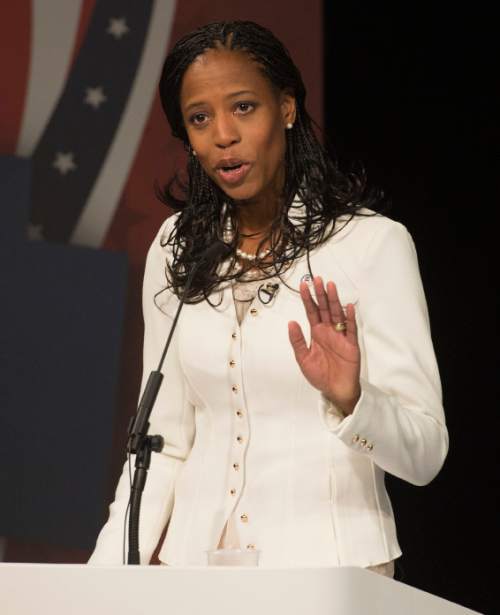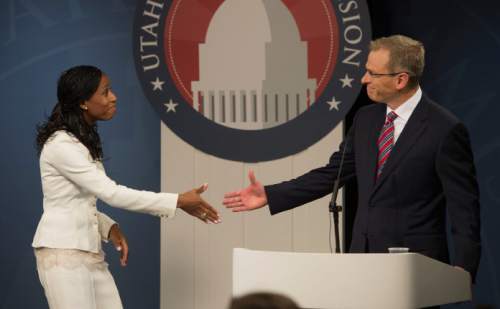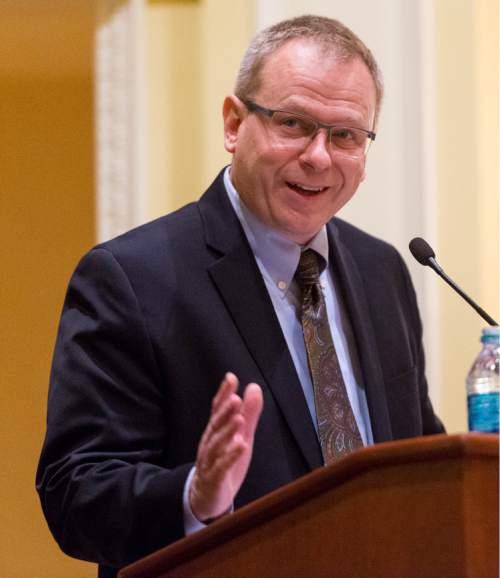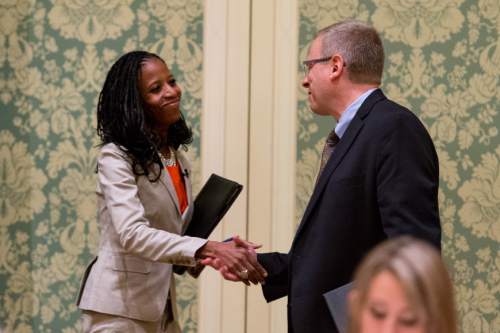This is an archived article that was published on sltrib.com in 2014, and information in the article may be outdated. It is provided only for personal research purposes and may not be reprinted.
Utah's 4th District race is expected to be the state's closest congressional contest and it pits two major-party candidates who have vastly different backgrounds, philosophies and goals. Republican Mia Love and Democrat Doug Owens also, not surprisingly, disagree on many of the key political issues, from control of public lands to immigration to the minimum wage.
Here's a primer on who these hopefuls are and where they stand:
—
How did they become politically engaged?
Doug Owens: His first political memories began when he was 9 years old. His father, the late Rep. Wayne Owens, was in the middle of his first congressional campaign when he embarked on a famous 711-mile walk through his district, culminating in a march down State Street to the state Capitol. Doug Owens would participate in that walk on the weekends and later worked on his father's campaigns, including the 1984 gubernatorial race in which he served as the volunteer coordinator under campaign manager Jim Matheson.
In 2000, Utahns elected Matheson to Congress and have kept him there for 14 years. He has decided not to seek re-election. Owens, in his first shot at elective office, is trying to keep the seat in the hands of the Democrats.
Mia Love: She underwent a political awakening after the terrorist attacks of Sept. 11, 2001. Shortly beforehand, she moved to Saratoga Springs, Utah, and a subdivision that had become inundated with lake flies. Love helped lead a community group that ultimately persuaded the developer to exterminate the pests. Her friends and neighbors encouraged her to run for the City Council in 2003. She became mayor in 2010.
Love ran against Matheson in 2012, coming 768 votes short of unseating the popular incumbent.
—
Why are they running?
Mia Love: Her goal is to push decision making from Congress and the president to local governments whenever possible. She believes states, counties and cities should take bigger roles when it comes to transportation projects, environmental protections, the management of public lands, health care and a host of other issues. She's promising to focus on "fiscal discipline, limited government and personal responsibility."
Doug Owens: His primary motivation is to help the middle class, which he says is where the American identity resides. He worries the middle class is shrinking and he believes government can help, primarily through bolstering the education system. Owens also believes the country should have a goal of making it economically feasible to have a parent stay at home with children if he or she desires.
—
Should the federal government or the state control Utah's public lands?
Doug Owens: State leaders want to force the federal government into handing over ownership of tens of millions of acres of land in Utah. Owens considers that just a pipe dream. He says representatives from other states won't go for it and even if they did, he says the state wouldn't have the resources to manage such vast lands.
He does believe that there should be some balance between the areas kept pristine and those used for mining, ranching or timber extraction.
Mia Love: She believes people in Utah should manage the lands within its borders, though she wants to keep the state's national parks in federal hands. Some areas would be targeted for recreation purposes and others for energy development.
—
Do they support an increase in the minimum wage?
Mia Love: She believes there should be no minimum wage, leaving companies and employees to negotiate pay. She said that the minimum wage has hurt black Americans, poor people and the undereducated from gaining employment. And she fears an increase would only make it more difficult for people in these groups to gain a foothold in the economy.
Doug Owens: He says he leans toward supporting an increase in the minimum wage, though he understands that there's a debate over its effectiveness. He says some believe an increase to $10.10 an hour would result in employers hiring fewer workers, but he said it would also lead to fewer people on food stamps and give the economy a jolt. He would also be open to indexing the minimum wage to inflation.
—
How should Congress reform immigration?
Doug Owens: He supports legislation similar to that passed by the Senate earlier this year that would include increased border security, a revamped visa system, workplace protections and a path to citizenship. He said undocumented immigrants, estimated to be about 11.5 million people, should pay a penalty to get legal status but believes that it's impractical and immoral to deport them all.
Mia Love: She also supports a pathway to citizenship, but only after Congress passes a series of other immigration measures to bolster border security, track people on temporary visas and streamline the naturalization process. She's the daughter of Haitian immigrants who gained citizenship in 1984.
—
What should Congress do with the Affordable Care Act?
Mia Love: if she had the chance to repeal it, she would. If that's not possible, she wants to focus on making health insurance portable and paying doctors for helping patients get healthy, rather than for procedures and tests. She's against an individual mandate, requiring people to have insurance or pay a fine. She's also against the tax on medical devices, a key industry in Utah.
Doug Owens: He says there's no chance the Affordable Care Act is getting repealed and it's time for Congress to focus on refining it. He also opposes the medical-device tax.
He wants to eliminate the link between employment and health care.
—
What should be the federal role in education?
Doug Owens: He says this is the biggest difference between him and his opponent. He believes the federal government plays a significant role in maintaining access to higher education through the administration of student loans. He also supports expanding federal support for public education by incentivizing the hiring of science, technology, engineering and math teachers.
Mia Love: She wants to limit the federal role in education, including its administration of student loans, which she blames for incentivizing colleges to increase tuition.
She also wants to reduce the influence of the Department of Education. In her first congressional race, she said she wanted to eliminate the department and produced a mailer calling for the end of federal student aid. She has stepped away from those positions.
Twitter: @mattcanham









